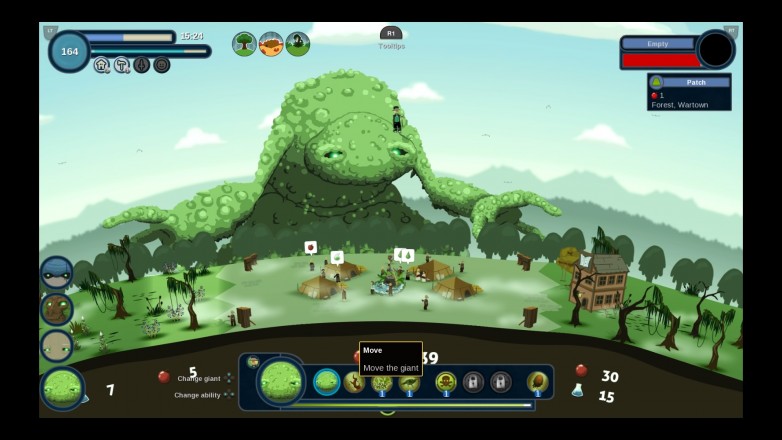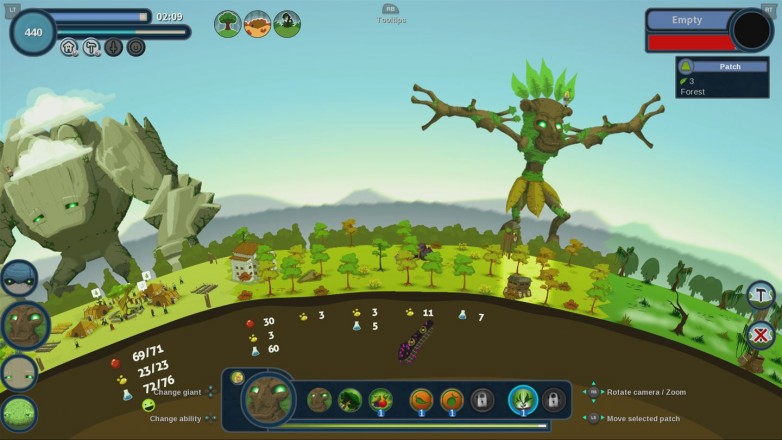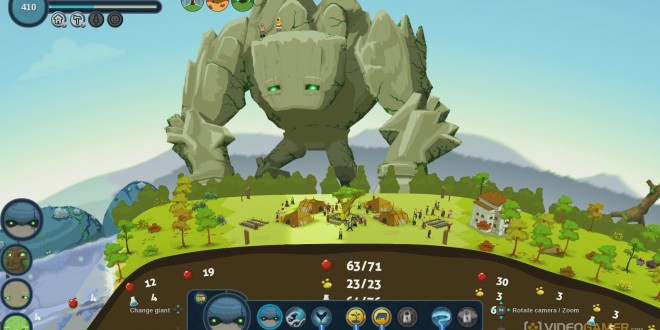Reus originally released on PC in May 2013, and it has now been ported to the PlayStation 4 and Xbox One. While the game has its issues, Reus still delivers fun gameplay and an abundance of charm on consoles. Reus is a god game in which you control four giants (Forest, Ocean, Rock, and Swamp giants), whose abilities allow you to create biomes and shape the land, create various animals, minerals, and plant life, and even unleash attacks. A typical game begins with a barren, round planet and the player must use the giants to create habitable lands for nomads to settle and build villages. From there, Reus challenges you to provide various resources for each village to prosper, while also maintaining order with villagers who may grow increasingly greedy.
To begin almost any game, you will either use the Rock giant to create a mountain and desert patch of land on the empty planet, or use the Ocean Giant to create an ocean and one of the two remaining giants (Forest or Swamp) to create a suitable biome on the surrounding wet earth. Once you have such an area setup, you will add some form of resource to make that patch of land habitable, which will result in a nomad settling a village there to harvest that resource. There are three main types of resources in Reus that you must provide for your villages: Food, Wealth, and Tech. The giants each have varying abilities to create plants, animals, and minerals; these in turn provide Food, Wealth, or Tech (or in some cases a combination of two or more). The trick to providing these resources lies in where you place them, as villages only have a limited surrounding range in which to place resources for use. In fact, a big part of Reus’s moment-to-moment gameplay is making decisions on how to best use the limited space of land you have and still provide enough of each resource to accomplish your goals. While this may sound tedious, it actually makes for some fun puzzle-solving and you feel accomplished once you get all the pieces to fit in just the right place.

As a village begins to acquire more resources, eventually its villagers will begin a Project. Projects in Reus are special buildings, such as a Granary, that help the village progress, and these require greater amounts of specific resources in order for your village to complete the Project. For example, you may need to raise the amount of Food In Use and Tech In Use for your village to 30 each in order for a Project to be completed. Once a Project is accomplished, a village will then offer one of its citizens as an Ambassador to your giants, and you have a choice as to which giant will pick up the Ambassador. When one of the giants picks up the Ambassador, that giant will unlock a new ability that can aid in providing or altering resources. Ambassadors are specific to the biome in which the village is settled, and each type of Ambassador (Forest, Swamp, or Desert) is capable of unlocking a specific skill for each giant.
In addition to completing Projects, providing resources will also contribute to a village’s Prosperity rating, which is essentially an overall rating that is based on the amount of each resource the village has in use. The greater the Prosperity, the quicker villages will begin new, more challenging Projects; this rating also affects how often a new nomad will come along to settle additional villages on your planet (provided there is enough habitable land to be settled). The ultimate goal is to progress your villages and complete as many Projects as possible, but there is a check on progressing any one village too quickly: Greed. A village’s Greed rating will increase if you provide too much of any resource too fast; for example, if a village only has 10 Food In Use but you have placed 60 Food within the village’s surrounding area, the Greed rating will likely increase. Keeping a reasonable margin between resource potential and how much of that resource is in use is key to keeping Greed low, otherwise a village may send an army to attack other villages or one of the giants.
Besides basic resource and Greed management, there are more complex systems in place which add gameplay depth to Reus. Plants, animals, and minerals have mini-goals called Symbiosis, and achieving these goals will result in greater amounts of Food, Wealth, or Tech coming from individual resources. Achieving Symbiosis goals is critical to advancing resources in order to complete the more advanced Projects. Most Symbiosis goals focus on having a resource occupy land next to another specific resource (such as a Blueberry plant next to a Strawberry plant). Additionally, some types of plants, animals, and minerals can only be created through Transmutations; Transmutation involves creating one resource and transforming it into another (for example, a Strawberry plant can be created from a Blueberry plant).

All of these systems combine for some very complex gameplay, but in my time with Reus I felt as though maybe it is too complex. While Reus is fun and provides some truly satisfying strategy, there are perhaps too many things at play here. I recognize that depth of strategy is a welcome trait in any god game, but I couldn’t overlook the feeling that Reus sinks under its own weight at times, and I experienced moments with the game that caused confusion and diminished the fun I was having with it. The game does allow you to pause the action at any moment, to let you gather your thoughts and even issue orders to giants that will be carried out once you unpause. But while this feature does help in moments of chaos (especially if you have multiple villages to manage), in my opinion, I still feel that Reus could have been better with a few less systems in place. The tutorial is the only mode available when you first begin the game, and given the complexity of Reus, this is a good decision. The tutorial doesn’t take too much of your time, and by the end of it the basics have been explained fairly well. From there, you can begin progressing through the main game modes or play freely with no time limit restrictions.
If you are a fan of god games and are looking for an experience to enjoy on your console, then Reus will suit you. Its charming art, relaxing music, and fun gameplay will delight you, even if you find yourself scratching your head at times.
Reviewed on Xbox One. Review copy provided by Soedesco.
Reus - 7.5
7.5
GOOD
Reus provides fun in a charming package, but is a bit too complex for its own good.
 Load the Game Video Games, Reviews, Game News, Game Reviews & Game Video Trailers
Load the Game Video Games, Reviews, Game News, Game Reviews & Game Video Trailers
